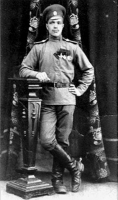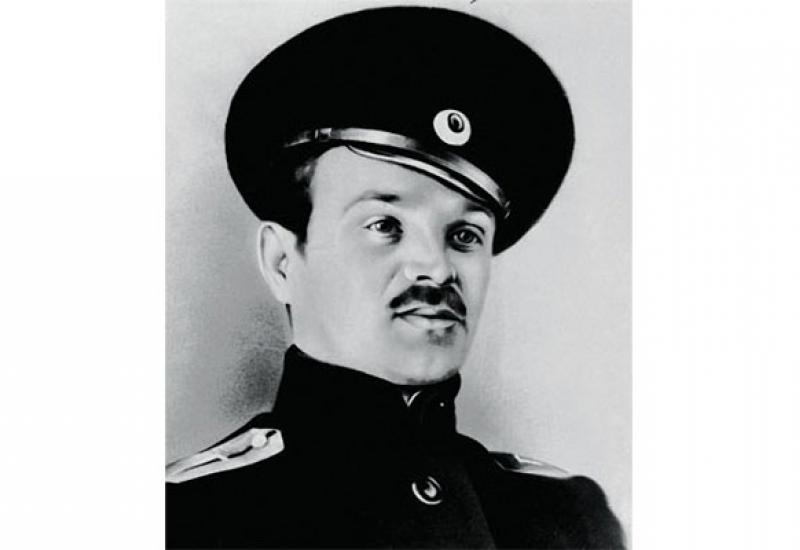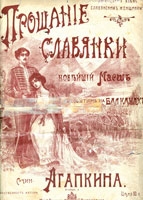June 22 marks the seventy-one years since the beginning of the Great Patriotic War. Our country has suffered numerous losses in it. The memory of the people who gave their lives in the battle against the worst enemy probably will trouble the soul as much as our people will live. After many years have passed since then, we will respect the heroism of our grandfathers and great-grandfathers who defended this land. And we should cherish the memory of all that inspired them to victory, leading the battle that reminded him of those who left them at home. Among the most dear and at the same time troubled memories for veterans - the melody of the immortal march "Farewell of Slav", whose centenary we will celebrate the fall of 2012. Its creation and the fate of its creator - a military conductor and composer Vasily Agapkin (1884-1964) is described in this material.
Basil Agapkin was born February 3, 1884 in the village Shancherovo of Michael’s region Ryazan province in the family of a poor peasant. Orphaned early, along with his brothers and sisters he had to beg. At age ten, stepmother led him to a brass band 308 th Reserve Battalion Tsar’s Astrakhan Infantry Regiment, to which he was enrolled as a student. The boy received a small but voiced pipe - cornet-a-piston. For five years Agapkin was voted best soloist-cornetist of the regiment - a rare case. In 1906 Vasily Agapkin was drafted into the army, in the Tver Dragoons, under Tiflis.
In December 1909, after the end of its military service, while mastering a new tool for him - pipe Agapkin went to Tambov - join the School of Music. January 12, 1910 he was appointed head of the seventh trumpet to Reserve Cavalry Regiment, and in autumn 1911 was admitted to the class of brass instruments Tambov Music School.
In October 1912, the First Balkan War begun. Balkan Slavs started a war of liberation against the Ottoman Empire, which resulted in the Balkan Union - Bulgaria, Greece, Serbia and Montenegro - have pushed Turkey from the Balkan Peninsula.
Agapkin these days do not stay in one place. Like his colleagues, he just raved about the Balkans, heroism of "bratushki-Bulgarians." He saw the Balkan Slav women saw off into battle with the Turks their fathers and sons, brothers and brides. Parting was difficult, everyone understands that not all of them come back, they may be parting forever. At the headquarters of the regiment, on the street, in the kerosene shop - everywhere he was something humming – the future march was being born. But the melody again and again escaped - devoid of deliberate bravura, it, according to the author, had become a symbol of the generosity of the Slavic heart, the expression of a single patriotism.
Marsh was born on a quiet street Gymnasicheskaya (now the Municipal Street) in Tambov autumn of 1912. Agapkin decided to show his new melody to the famous composer, military bandmaster Lithuania 51st Infantry Regiment Jacob Bogorad. For this he went in Simferopol. Together they came up with the name of the march - "Farewell of Slav." Bogorad some time later published in Simferopol hundred copies of notes of the march. On the cover - a young woman who says goodbye to a soldier, the Balkan mountains in the distance and a detachment of soldiers. And the inscription: "Farewell of Slav" - the latest march to the events in the Balkans. Dedicated to all the Slavic women. Agapkin product. "
Soon melody sounded already over the whole Russia. Due to the fact that Kiev record company "Ekstrafon" the summer of 1915 released gramophone records of the march, he became famous very quickly. The melody of the march received worldwide fame: it began to carry out military orchestras in Bulgaria, Germany, Austria, Norway, Romania, Spain, Sweden, Yugoslavia and other countries.
 March "Farewell of Slav" remained popular after the October Revolution of 1917, especially in the white camp. His melodies underpinned the songs of the Volunteer Army, Siberian People's Army, the army of Kolchak, Drozdovskaya division. Perhaps that is why in the USSR if the march was not officially banned, but in any case, was not encouraged. Despite the fact that the march is mentioned in the book of music "service-combatant repertoire for orchestras of the Workers 'and Peasants' Red Army", released in 1945, in his description of the compiler collection, composer, Major General S.O.Chernetsky criticizes march for primitivism avaricious and harmony as "a typical pre-revolutionary march."
March "Farewell of Slav" remained popular after the October Revolution of 1917, especially in the white camp. His melodies underpinned the songs of the Volunteer Army, Siberian People's Army, the army of Kolchak, Drozdovskaya division. Perhaps that is why in the USSR if the march was not officially banned, but in any case, was not encouraged. Despite the fact that the march is mentioned in the book of music "service-combatant repertoire for orchestras of the Workers 'and Peasants' Red Army", released in 1945, in his description of the compiler collection, composer, Major General S.O.Chernetsky criticizes march for primitivism avaricious and harmony as "a typical pre-revolutionary march."
The march was designed for the military brass band, without words. All texts appeared later. V. Lazarev, A. Mingalev, A. Fedotov, Galich and other poets have written poems to the tune of the march. "Farewell of Slav" with the text of the words of Roman Shlezak called "Rozszumialy sie wierzby placzace" ("weeping willow are making noise") was in 1942-1945 anthem of the Polish underground military organization - the Home Army (Armia Krajowa).
Was there "Farewell of Slav" during the parade November 7, 1941 on Red Square is an open question. Musicians combined orchestra argued that the march was played. Budyonny in his memoirs supported them. This view is shared by the pupil Agapkin, Head of the Military Band service of the Soviet Army, People's Artist of the RSFSR, Major-General Nikolai Nazarov. At the same time, the archives contain a precise list of works that were carried out then. The famous march is not among them. The march was not played out by the consolidated one thousand trumpet orchestra during the Victory Parade of 1945.
It was only after the release in 1957 of the famous film of Michael Kalatozov "The Cranes Are Flying" this march was rehabilitated (the film won the "Palme d'Or" at the Cannes Film Festival in 1958). The film is a poignant soul scene: a farewell of the volunteers. A huge number of those who escorts were near school, where behind the metal fence of the yard there gathered volunteers. Along the fence in desperation Veronica run, unsuccessfully seeking her Boris. Painful tension of the last seconds - and suddenly the orchestra struck up the march "Farewell of Slav" ...
Then march sounded in the films "Belarusian Station" (1971), "The Great Patriotic War" (1979) and dozens of others.
These days, the sounds of the march go to flight passenger ships on the Volga and firm trains. Also, the sounds of the march are played when trains with Russian Federation recruits who go to the place of service depart from railway stations.
... In 1918 Vasily Agapkin volunteered for the Red Army and organized a brass band in the 1st Red Warsaw Hussar Regiment. In 1920 he returned to Tambov, led the music studio and orchestra troops GPU.
In 1922. B. Agapkin was moved to Moscow for the post of Kapellmeister of the 17th special forces regiment of the OGPU. After a year the regiment was disbanded and Agapkin had to find a new job. He gets the place of the 1st conductor of the Moscow School of Transportation Department of the OGPU.
He had a hard time: in a certification from December 31, 1925 it was noted that Agapkin politically underdeveloped, does not like the comments, proud. At the same time he was appreciated as a professional: "He loves and knows his work. He has authority among subordinates. He is good for his work." In the following certifications political development Kapellmeister already assessed as satisfactory, but stressed that he is a good leader of the orchestra and likes his work ...
At the end of January 1924 Agapkin orchestra accompanied on his last journey Lenin.
In 1928 V.Agapkin organized a brass band of homeless children.
In 1930 he was invited to the post of conductor of the orchestra of the Central School of the OGPU (from July 1934 Central School of the NKVD, in March 1939 with the Graduate School of the NKVD). Vasily quickly organize a team of military musicians, who soon began to perform regularly in the garden "Hermitage", consistently attracting general attention of listeners.
In June 1938 the commandant of the Moscow Kremlin invited him to the commission to improve the music melody of the clocks Spassky Tower. He composed the melody of Kremlin chimes - a short but extremely expressive tune. In it, he combined the majestic chimes traditional Russian church bells with music optimistic songs of the 1930s.
When the Great Patriotic War begun, Agapkin was already 57 years old. He was awarded the title of a military quartermaster rank 1 and he was appointed head of brass bands Motorized Rifle Division Dzerzhinsky.
He was entrusted to conduct joint orchestra at the historic parade on Red Square on November 7, 1941 (the main parade of the country at that time was held in the city of Kuibyshev, where the combined orchestra led by Principal Conductor of the Workers 'and Peasants' Red Army S.O.Chernetsky). Not having enough time for rehearsals, in strict secrecy Vasily was able to prepare well for the performance of musicians. The People’s Commissar of Defense of the USSR Joseph Stalin distinguished him. Radio broadcasts music from this parade raised the morale of our people in the rear and at the front and inspired confidence: Victory will be ours!
June 24, 1945 at the Victory Parade, which will forever remain in the memory of a grateful humanity rescued from the brown plague, the orchestra Agapkin as one of the organizers of the music and the first deputy chief conductor was part of the joint orchestra.
8 years later, when Stalin was buried, Colonel Agapkin was again before the combined orchestra.
Musical heritage V.I.Agapkina included dozens of beautiful melodies (12 combatant and 9 counter marches and waltzes and ballads), but the march "Farewell of Slav" is undoubtedly the most famous in the works of the composer. All the concerts the orchestra VI Agapkin ended in the execution of "Farewell of Slav." "Melodia" repeatedly released records with the famous march in large quantities.
Agapkin died October 29, 1964 and was buried at the cemetery Vagankovsky in Moscow. On his grave there is a modest gray monument stele on which inscripted the gold stamped notes: The first three tacts of "Farewell of Slav." Marsh, that has become a heroic and bright part of the history of the Slavic peoples, whose music inspires and enlightens, says in our souls the main human values on which all life is based.
... Every time, having heard the tune of "Farewell of Slav", I have a lump in my throat rises and overflows the consciousness of infinite respect for the defenders of our native land and proud of my involvement in it. Let this unique beauty and strength of the march more than one century will provide confidence in the victory of our ideals, making our bodies stronger and souls lighter!


 "I played under the direction of Agapkin many years - recalled veteran of the military band service L.G.Korovko. - Balanced, calm and very kind people. He permitted musicians, to play in theaters and learn ... He studied himself until his last years. He gathered a huge music library at home, had a wonderful harmonious gift. And he was a brilliant cornetist. And at the end of life he slowly became deaf. It was his most personal drama ... "
"I played under the direction of Agapkin many years - recalled veteran of the military band service L.G.Korovko. - Balanced, calm and very kind people. He permitted musicians, to play in theaters and learn ... He studied himself until his last years. He gathered a huge music library at home, had a wonderful harmonious gift. And he was a brilliant cornetist. And at the end of life he slowly became deaf. It was his most personal drama ... "